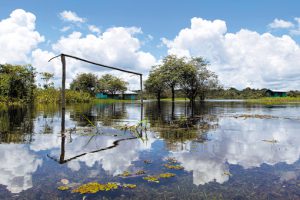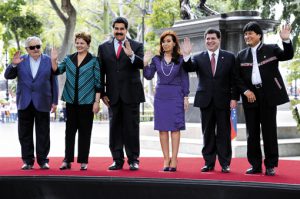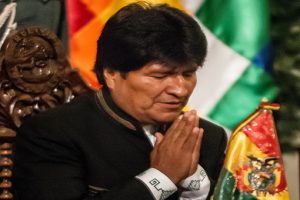
Getting to Win-Win: FTAs in the Americas
Over the past several decades, many of the hemisphere’s trade agreements have included impressively robust provisions on labor and the environment, but gaps in both implementation and enforcement have raised concerns about their effectiveness. Those concerns are especially timely as the region’s economic policymakers begin discussing efforts to facilitate greater international trade and investment, such … Read more

Democracies and Dictatorships in Latin America
Latin America experienced a dramatic political change in the last quarter of the twentieth century. At the onset of the so-called “third wave” of democracy in 1978, the only democratic regimes were Costa Rica, Colombia and Venezuela. But by 1995, all the countries in the region, with the notable exception of Cuba, were democracies or … Read more
Brazil, Ecuador, and the Inter-American Human Rights System
The Inter-American Commission on Human Rights (IACHR), the independent human rights body of the Organization of American States (OAS), experienced a period of intense political turmoil from 2011 to 2013. Criticism of the Commission by members of the OAS—most notably Ecuador, Nicaragua and Venezuela—was echoed by Colombia, Peru and others in their vocal disapproval of … Read more
Monday Memo: U.S.-Cuba Talks — Colombia Peace Talks — Latin American Currencies — New Uruguayan President — Peruvian Ecotourism
This week’s likely top stories:U.S.-Cuba talks promising; New delegation for FARC peace talks; Dollar strengthens against Latin American currencies; Tabaré Vázquez takes office; Peruvian businesses to learn from Costa Rican ecotourism. U.S.-Cuba Normalization Talks Promising: After two rounds of talks—one in Havana last month and the second in Washington DC on Friday—the U.S. and Cuba … Read more
Stay on the Korean Wave, Latin America
The perception Korea once held of Latin America—of lazy workers and inefficient governments—has drastically changed today. From an entire floor dedicated to South Korean music, cuisine and clothes at a mall in Peru, to the first Korean Cultural Center in Argentina, to the United States Ambassador to Costa Rica singing and dancing to Psy’s Gangnam … Read more
El comercio de armas entre Rusia y América Latina
Foto: Andrewy Korchagin (Flickr). Traducido por Martha Alicia Bravo Rusia busca la expansión militar en América para consolidar los tratos comerciales y desarrollar vínculos militares e intergubernamentales más estrechos. Este esfuerzo también produce beneficios colaterales: Rusia ha asignado contratistas y asesores en los ministerios de defensa y cuarteles militares locales, quienes tienen la capacidad de … Read more

A Dash of Color: Latin America’s Color Runs
Chalk it up to the running craze in Latin America. Or to the revitalization of the region’s cities. Either way, the U.S.-based Color Run is turning the hemisphere’s streets into a rainbow of vibrant color. The urban running events—which are billed as “the happiest 5K on the planet”—involve a 3.1-mile sprint through a city while … Read more

Latin America and UN Climate Talks: Not in Harmony
When it comes to climate change, Latin American citizens and their leaders get the big picture. According to surveys, the region’s citizens are very worried about global warming, and its leaders frequently cite climate change as a major national security threat at United Nations conferences. However, the consensus appears to largely end there. National positions … Read more

A Post-Hegemonic Paradise in Latin America?
Click here to view the table of contents for the Winter 2015 issue of AQ. As Latin America tries to get a better grip on the precise contours of the post-Great Recession world order, a few assumptions have calcified into conventional wisdom. The first assumption is that the United States is no longer the hegemonic … Read more
New Study Ranks Democracy in Latin America
Only two countries in Latin America—Costa Rica and Uruguay—can be considered “full democracies,” according to an Economist Intelligence Unit (EIU) study commissioned by BBC for Democracy Day on January 20. The report says that a majority of Latin American countries hold “free and fair” elections and are better ranked than their counterparts in the Middle … Read more
Russo-Latin American Arms Sales
Photo: courtesy of Flickr user Andrewy Korchagin. Russia is pursuing a military buildup in the Americas to consolidate commercial deals and develop closer military and inter-governmental ties. The push also brings collateral benefits: Russia has placed contractors and advisers in local defense ministries and military headquarters who can influence doctrine, tactics and purchasing decisions. In … Read more
Endnotes: Russo-Latin American Arms Sales
Below are the endnotes from “Russo-Latin American Arms Sales” by Diana Negroponte (Winter 2015 AQ.) Elizabeth Romero, “”Negocian” base rusa en Nicaragua,” La Prensa, February 27, 2014, www.laprensa.com.ni/2014/02/27/politica/184445-negocian-base-rusa-en-nicaragua. “Costa Rica’s foreign minister accuses Russia of helping militarize Nicaragua,” The Tico Times, May 4, 2014, www.ticotimes.net/2014/05/04/costa-ricas-foreign-minister-accuses-russia-of-helping-militarize-nicaragua. Stockholm International Peace Research Institute (SIPRI) Arms Transfers Database, www.sipri.org/databases/armstransfers … Read more

Incumbents Aren’t Latin America’s Problem
It’s been an exceptionally good year for incumbents in Latin America. Since June, Colombia’s Juan Manuel Santos, Bolivia’s Evo Morales and Brazil’s Dilma Rousseff each won their respective presidential contests. Rousseff’s late October re-election will give her center-left Partido dos Trabalhadores (Workers’ Party—PT) a fourth consecutive term in office. As it turns out, it’s been an exceptionally … Read more
Monday Memo: Cuba’s Ebola Response – Petrobras Scandal – Morales’ Third Term – Federal Police in Guerrero – Hurricane Gonzalo
Cuba to ramp up Ebola response: Cuba is expected to host the leaders of the Alianza Bolivariana para los Pueblos de Nuestra América (Bolivarian Alliance for Americas—ALBA) countries today to strategize an increased response to the Ebola crisis. Cuba, which was among the first to respond to the crisis in West Africa with human resources, … Read more
Mesoamerica’s Infrastructure Projects and Reducing Climate Change
This week, New York City hosted the Climate Summit 2014, an event aimed at shaping the world’s future developmental policies. Just one month earlier in Nicaragua, delegates from the Mesoamerican region met to analyze the social, environmental and economic impacts of severe droughts this year. Proyecto Mesoamérica (Mesoamerican Project), launched in 2008 by heads … Read more


